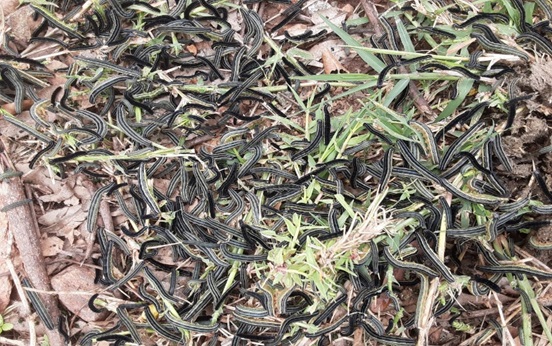
Kiruhura, Uganda | THE INDEPENDENT | Farmers in Kiruhura district are bothered by the outbreak of fall armyworms which have so far been sighted in four sub counties. The migratory pests have spread to the areas of Kikatsi, Rweshande, Kayanja and Kanoni, where they have already destroyed several acres of pastures, maize gardens and banana plantations.
Agaba Ruteitera, one of the affected farmers in Karuroko cell, Kikatsi sub county says that he has lost up to 100 acres of pasture on the farm over the last four days when the pests were detected in the area.
The striped caterpillar is known to feed on more than 80 plant species including maize, millet, sorghum, rice and wheat, as well as legumes, cotton and pasture grass varieties that are used as cattle feed. Agaba says that although he had been advised to spray the moths with insecticide, they multiplied faster than anticipated.
Kiiza Daniel, another farmer in Rweshande sub county says that he has lost over 150 acres of pasture since Saturday when the worms were detected on his farm. He says the animals cannot eat the pasture after the area has been devastated by the worms, and when they do, they become weak and bleed.
Stephen Gumisiriza, another farmer fears that their incomes and livelihood will be affected by the resurgence of the fall armyworm because their cattle cannot produce as much milk as they did before the outbreak.
Kiruhura District Agricultural Officer Anthony Tayebwa advised farmers to consider this an emergency and spray their farms with cypermethrin, a synthetic chemical that interferes with the insect’s nerve cells and prevents the insect from performing normal functions like feeding and grooming. However, he said the farms must be abandoned for five to 10 days after spraying.
Kiruhura district chairperson Dan Mukago says the worms will be hard to contain because people in the area have vast farmlands.
The Ministry of Agriculture has so far confirmed the outbreak in more than 40 districts, among them Luwero, Mukono, Wakiso, Bukedea, Katakwi, Bugweri, Serere, Busia, Bugiri, Mityana, Kiryandongo and Namutumba.
*****
URN
 The Independent Uganda: You get the Truth we Pay the Price
The Independent Uganda: You get the Truth we Pay the Price



